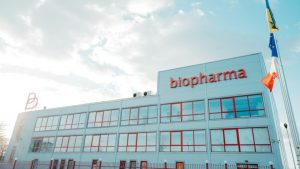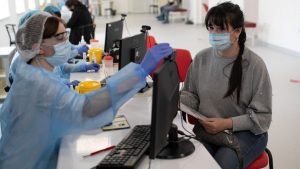
The biopharmaceutical company Biopharma (Kyiv) is limited in possibilities of increasing production of the Bioven medication (immunoglobulin) due to the lack of plasma donation culture in Ukraine and the lack of plasma, Oksana Plotnikova, director of strategic development at Biopharma, has said.
“We would like to expect an increase in Bioven production, which is why we are creating plasma centers to increase donor activity among the population. We have many blood donors, but the country does not have a culture of plasma donation for fractionation,” she said at a press conference on the completion of clinical trials of the Bioven drug in the complex therapy of patients with coronavirus disease (COVID-19) on Wednesday.
Plotnikova said that as the world completes clinical trials confirming the effectiveness of drugs based on blood plasma in treatment of COVID-19, the demand for such drugs, and, therefore, plasma will grow.
“We are on the verge of the fact that many countries – Canada, Europe – will restrict imports. There will be no imported drug in the country,” she said.
Plotnikova reported that “Ukrainian donors today do not donate the amount of plasma that could meet the needs of Ukraine.”
“Today, in order to provide Ukraine, we buy plasma from the United States, Slovakia. We cannot buy Indian or Vietnamese plasma, because we do not buy plasma that is not standardized under European standards,” she said.
Plotnikova said that Biopharma actively cooperates with communal blood centers, “so that communal stations develop, reconstruct and procure not only blood components for hospitals, but also plasma for fractionators to provide Ukraine with drugs.”
“The demand for intravenous infusion of immunoglobulin G, and subsequently convalescent plasma and hyperimmune immunoglobulin, is obvious. Today we see and understand that the real effectiveness of the drug makes it possible to save lives, which means that the need is growing,” she said.

Biopharma pharmaceutical company (Kyiv) has accumulated about 150 liters of plasma from 118 donors who have had coronavirus (COVID-19) for the production of the drug for COVID-19, and the same amount is needed to create an experimental series.
The company informed Interfax-Ukraine that it is necessary to collect 300 liters to create the first experimental series of drugs.
“Not everyone who is diagnosed has developed antibodies, but they are the main weapon against the disease. However, there are cases of asymptomatic course of the disease. That is why everyone who donate plasma in our centers is tested for antibodies to COVID-19,” said the president of the company, Kostiantyn Yefymenko.
He called on Ukrainians, representatives of government, business and public activists to help attract donors who have overcome the coronavirus.
He said that if antibodies are detected, the collected plasma is used to create a drug for coronavirus, if there are no antibodies, then other drugs are made from donated blood.
Biopharma also reports that clinical trials of use of Bioven in the symptomatic treatment of coronavirus are completed. This drug is also produced from donated plasma. In particular, according to the company, during the Bioven research, Ukrainian and international experts noted that it reduces the severity of the cytokine storm and helps stabilize the condition of seriously ill patients.
“The preliminary results of the studies are extremely encouraging: everyone who took Bioven, observe the stabilization of the general condition up to two days after taking the drug, followed by a decrease in manifestations of respiratory failure,” the company reported.
As reported, clinical effectiveness trials of domestic drugs AMIZON MAX (produced by Farmak), Amiksin IC (Interchem), Bioven (Biopharma) and Corvitin (BHFZ) are underway in Ukraine.

Biopharma pharmaceutical company (Kyiv) urges citizens who came through coronavirus (COVID-19) to become plasma donors to develop a medicine against this disease, which the company is launching. The company told Interfax-Ukraine that hyperimmune immunoglobulin may be effective for specific treatment of COVID-19.
The development of the medicine is carried out under Biopharma’s participation in the work of the International alliance of companies specializing in the production of blood plasma medicines, which also includes Takeda and CSL, Octapharma, Biotest, BPL, LFB, Sanquin, GreenCros, ADMA Biologics.
“Our plasma centers in Sumy, Cherkasy, Dnipro, Kharkiv began plasma blank. All the facilities of our plant in Bila Tserkva, all the forces of our team are directed to the development of medicines. I am sure that effective treatment of COVID-19 will appear,” co-owner of the company Kostiantyn Yefymenko wrote on Facebook.
In turn, businessman Vasyl Khmelnytsky, a co-owner of Biopharma as well, said that the development of an effective medicine against COVID-19 requires the support of people around the world who are ready to donate their plasma after coming through the disease.
“We urge those who have recovered to contribute to the fight against the pandemic and, if their health allows, to become a donor,” he wrote on Facebook.
The company said that Biopharma urged all survivors who wish to become blood plasma donors to contact the company’s hotline. Donors will be transported to their plasma centers, where blood plasma can be donated, and back, and they will get compensation for donation.
The company said that it is ready to register and transfer donors from any settlements.
In addition, Biopharma said that one more direction of the fight against coronavirus infection is the clinical study that have begun to evaluate the effectiveness of Bioven medicine manufactured by Biopharma Plazma LLC in the complex treatment of patients with pneumonia caused by COVID-19 and SARS- CoV-2 coronavirus infection.